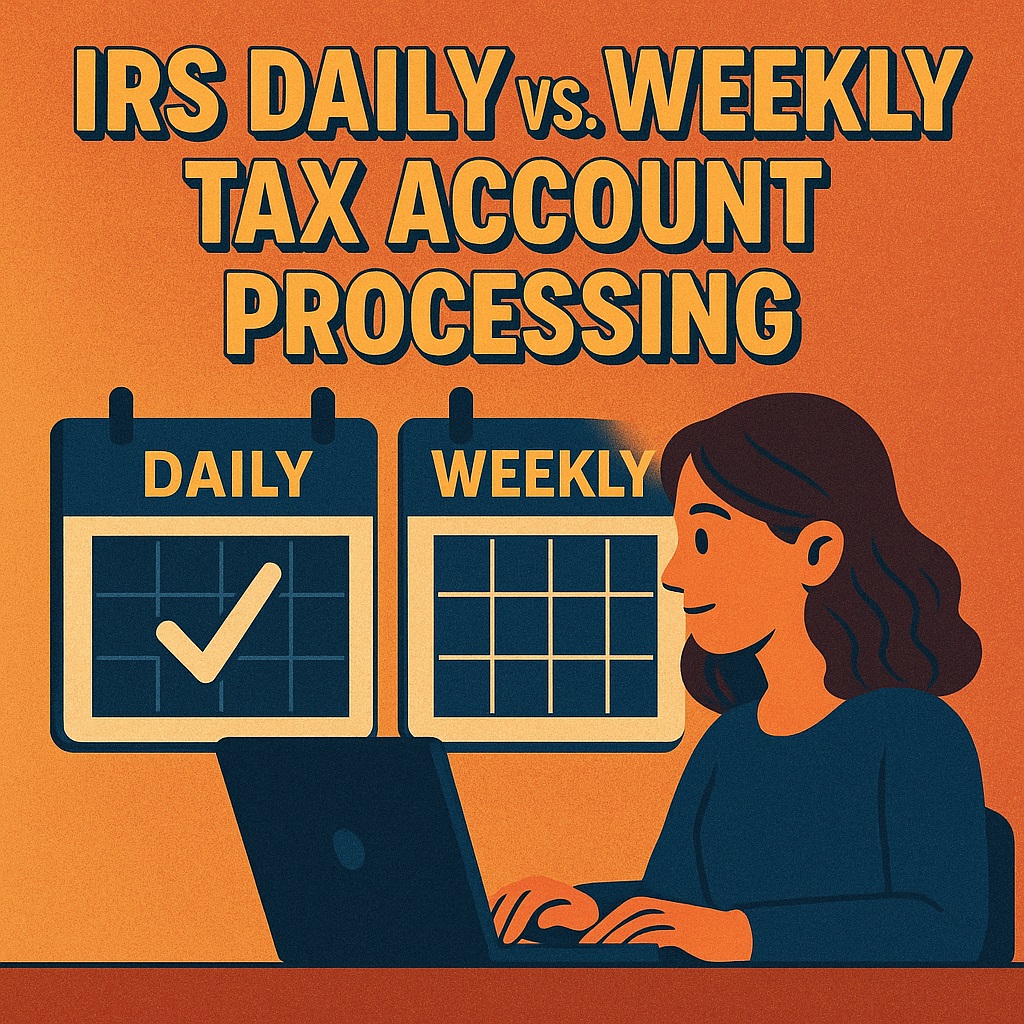The IRS processes tax accounts on either a daily or weekly cycle, depending on specific account characteristics and triggers. Knowing whether your account is processed daily or weekly can help you anticipate when your tax return, refund, or account updates will be processed and explain potential delays. This guide breaks down the differences between daily and weekly processing, including what triggers each and how to identify your processing cycle.

What Determines IRS Daily vs. Weekly Tax Account Processing?
The IRS uses two processing cycles to manage tax accounts: daily and weekly. Your account’s cycle depends on its characteristics, such as whether it has special flags, pending issues, or requires additional scrutiny. Daily processing is standard for most taxpayers, while weekly processing is reserved for accounts needing extra verification. Below, we’ll explore the characteristics and triggers for each cycle.
Daily Processing: Characteristics and Details
Daily processing applies to most individual taxpayer accounts without complex issues. Here’s what defines daily processing:
- Standard Accounts: Accounts with routine tax returns and no special conditions or flags.
- Update Days: Transactions post to the IRS Master File on Friday, Monday, Tuesday, and Wednesday.
- Refund Status Updates: Typically available midweek, often by Wednesday.
- No Pending Issues: Accounts free of holds, audits, or flags that require extra review.
Who Qualifies? Most taxpayers with straightforward returns (e.g., no audits, no identity theft flags) fall under daily processing.
Weekly Processing: Triggers and Characteristics
Weekly processing is reserved for accounts requiring additional verification or special handling. These accounts are processed on Thursdays, with updates typically available by Saturday. Common triggers for weekly processing include:
- Identity Theft: Accounts flagged for suspected identity theft or confirmed identity theft cases.
- Bankruptcy: Taxpayers with bankruptcy filings or accounts in bankruptcy status.
- Injured Spouse Claims: Joint returns where one spouse claims relief from shared tax liabilities.
- Incarcerated Taxpayers: Accounts linked to prisoner status.
- Audits or Examinations: Returns flagged for review or under audit.
- Foreign Addresses: Accounts with non-standard residency or foreign addresses.
- Tax Module Freezes: IRS hold codes (e.g., Code 570) requiring further review.
- Offers in Compromise: Accounts with pending offers or uncollectible status.
- Penalty Transactions: Certain unreported adjustments or penalty-related issues.
- Prior Year Adjustments: Changes tied to previous tax filing seasons.
- Posting Delay Codes: Transactions marked for delayed processing.
- System Flags: IRS software or system flags indicating the account needs weekly review.
Why Weekly? Weekly processing gives the IRS extra time to verify return accuracy or resolve complex issues before updates are posted to the Master File.
Daily vs. Weekly Processing: Summary Table
To make it easier, here’s a breakdown of daily and weekly processing:
| Processing Type | Description | Update Days | Common Triggers |
|---|---|---|---|
| Daily | Standard accounts without special issues | Friday, Monday, Tuesday, Wednesday | No flags, routine processing |
| Weekly | Accounts needing additional review | Thursday (processing); Saturday (updates) | Identity theft, bankruptcy, audits, injured spouse claims, foreign addresses, tax module freezes, penalty issues, posting delays |
How to Identify Your Processing Cycle
You can determine whether your account is processed daily or weekly by checking the cycle code on your IRS account tax transcript:
- Daily Cycle Codes: End in 01–04 (e.g., 20240601 = Friday, 20240602 = Monday, etc.).
- Weekly Cycle Codes: End in 05 (e.g., 20240605 = Thursday).
To access your transcript, visit irs.gov/transcripts and log in or request a mailed copy.
Pro Tip: Accounts can switch between daily and weekly processing based on new issues (e.g., an audit flag) or resolved conditions (e.g., a cleared hold) across tax years.
Why Understanding IRS Processing Cycles Matters
Knowing your IRS processing cycle helps you:
- Anticipate Refund Timelines: Daily accounts often see faster refund updates, while weekly accounts may face delays due to extra scrutiny.
- Track Account Updates: Understand when to check for changes, like refund approvals or resolved holds.
- Identify Delays: Recognize if flags like identity theft or audits are slowing your processing.
- Plan Finances: Stay informed about when payments, credits, or refunds will post.
Additional Tips for Navigating IRS Processing
- Monitor Your Transcript: Regularly check your IRS account tax transcript at irs.gov/transcripts to track cycle codes and updates.
- Understand Delays: Weekly processing often indicates complex issues. Refer to IRS resources or a tax professional for clarification.
- Use IRS Tools: The IRS’s “Where’s My Refund?” tool or Transaction Code Pocket Guide can provide further insight.
Understanding whether your IRS tax account is processed on a daily or weekly cycle is crucial for tracking your tax return, refunds, and account updates. Daily processing applies to standard accounts, with updates Monday through Friday, while weekly processing handles complex cases like audits or identity theft, with updates on Saturdays. Check your IRS transcript’s cycle code (ending in 01–04 for daily, 05 for weekly) to confirm your processing type and anticipate timelines.
Access your transcript at irs.gov/transcripts today to stay informed about your tax status!
